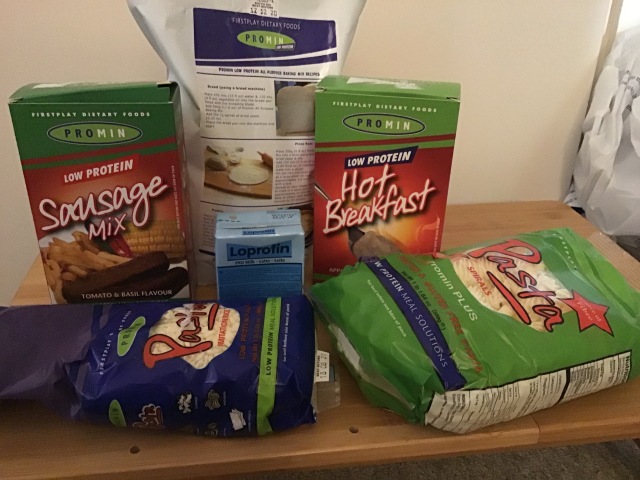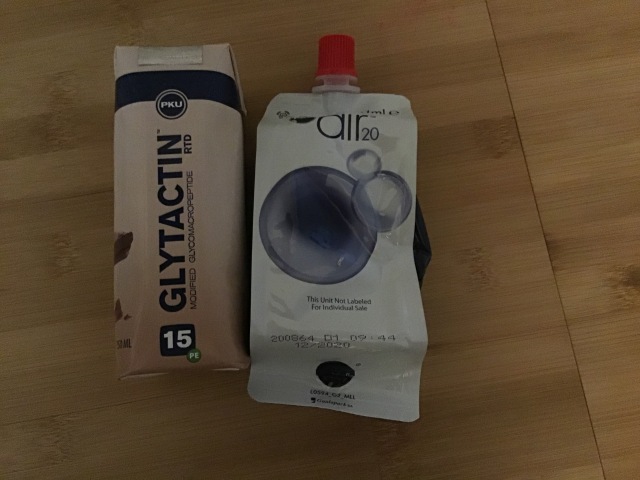
I’m sure most people reading this have never heard of PKU, but it’s been familiar to me throughout my entire life, as I have the condition myself. Phenylketonuria or PKU is a metabolic condition that means the body can’t break down phenylalanine (a component of protein) properly, so it builds up in the bloodstream and inhibits brain development. It’s screened for at birth, and the main treatment is a low protein (technically low phenylalanine) diet. Without the diet, children with PKU grow up severely brain damaged, so it’s absolutely vital!
Since yesterday was International PKU Day (I didn’t manage to finish this post until today), I thought I’d share a bit of my experience with PKU, and an idea of the challenges that we face.
High protein foods, e.g. meat, fish, eggs, cheese, most legumes and pulses, tofu and nuts are all on the “red list”, meaning they can’t be eaten on the diet. Medium protein foods such as bread and pasta are also on the red list. The PKU diet is made up of fruits and vegetables; measured amounts of lower-protein carbohydrates like potato and breakfast cereal; and specially made low protein foods: breads, flour, milk, pasta, rice, and others; plus a protein substitute which is essentially phenylalanine-free protein, with added vitamins etc to make up what we don’t get from our food. Here in the UK, we’re able to get these products on prescription, but in most countries in the world they have to be purchased at huge expense.

Now you have a basic idea of what the diet is (in reality, it’s hugely complicated and this post could fill a book if I let it), I’ll tell you a bit about my experience living with PKU.
The diet has been a challenge my whole life, more in some times than others. Some of my earliest and most vivid primary school memories involve hiding my food behind my lunchbox, being teased because of my protein substitute (then a foul-smelling “blackcurrant” paste), and envying various items my classmates were eating. At secondary school, we tried to discuss the possibility of my having school dinners, but my year head just couldn’t understand why it required planning and in the end we gave up and I kept having packed lunches. Temptation became a big thing when I started sixth form college, and I fell into really bad habits of sneaking food I wasn’t supposed to. There’s a long story attached to that, but it’s a bit complicated for this post.
It’s recommended “diet for life”, although in practise many adults come off diet, for various reasons. I can’t remember when I decided that I wanted to, at some point in my adult life, come off diet. (Temporarily, just for the experience.) The reasons I started seriously considering it are also very complicated, but I think the clinching factor was timing: I thought it better to risk having to redo my A-levels if I experienced side-effects, than redo a degree, or lose a job. I came off diet for just over a year during my third (out of four) years of A-Levels.
It is impossible to describe the experience of coming off diet. It took me a while to get used to some kinds of meat, but otherwise I liked most of the foods I’d never had before. I think I was a bit of a foodie already, but I’m much more so now!
How adults are affected off diet varies widely; it’s currently not possible to predict how someone will fare eating normal food. I never noticed any obvious symptoms, perhaps because common symptoms overlap with ME/CFS which I also have, but in case it was making a subtle difference, I went back on a year before I left for university.
Most of my struggles during university were because of my ME (that’s probably for a different post), but as time went on I had less and less energy to manage my diet. The thing about the diet is that you can’t just go out and buy a ready meal or a loaf of bread (In those days, I didn’t like any of the ready-made breads on prescription, so had to bake my own); almost everything has to be made from scratch, which is extremely time-consuming and energy-draining. During the latter part of my first year, with coursework deadlines looming, I felt that something had to give. I couldn’t stop going to lectures or trying to do my coursework, and by that time I had no social life to sacrifice, so I paused the diet so I could channel the energy it took into getting my work done. With a deferral this took until the end of the summer, so I was effectively going back on diet at the same time as starting a new year, in a new house on a new campus, and that was a really bad move in hindsight. In the end I decided I was going to have to give up the diet until I had finished university completely.
My three-year degree took five years, thanks to my ME, and by the time I’d finally finished it, my overall health was much worse than when I’d started. I’d exhausted myself by doing it. I don’t regret doing it, because I learned so much and really needed the independence for my own mental health, but I could tell I wasn’t going to handle going back on diet yet. That was back in 2015. Although my health stayed pretty much the same between then and two summers ago, my mum made an offer which completely changed things: to batch-cook stuff for me to fill my two freezers with.
After weeks of brainstorming food ideas and searching online to find low protein replacements for the high protein foods I’d become so fond of—delighted to find that the rising popularity in veganism has brought about a lot of vegetable-based creativity—I decided to give it a go. It took months of preparation, because I’m a cautious person (and prone to indecision) and wanted to plan as much as I could in advance to save running into problems later.
I’ve been back on diet since August last year, and initially it was quite exciting and I was able to experiment a lot with new recipes, cooking more than I expected as I was prioritising my diet over everything else. Unfortunately it became much more difficult as a sleep issue drastically reduced my energy, but I managed to keep the diet up. I’ve been taking valerian drops since around February, and my energy levels have improved again, which couldn’t have come at a better time! Lockdown has made the diet more challenging in the area of getting hold of the right food, even now I can finally access delivery slots, and now the hot weather is sapping my energy again. But I’m confident I can keep going.

I didn’t notice any problems of being off diet for all those years—though an MRI scan showed “white matter” in my brain—but people around me have reported an improvement in my general mood since returning to my diet last year. I feel good about being back on it, as I used to suffer guilt for what being off might be doing to my brain. As a bonus, my protein allowance is now 10g of protein a day—very little compared to the 70g the average person eats, but phenylalanine tolerance varies widely and that’s comparatively high! Many other adults are on 5g or even less. That’s two and a half Weetabix, or a large portion of McDonald’s fries, or a quarter of a tin of baked beans.
Although the UK is, as I understand it, the best country to be in if you have PKU, that doesn’t mean the system is perfect. A lot of medical professionals have trouble understanding that we can’t just get our special prescription foods in the supermarket like gluten-free products, so many patients have trouble getting prescriptions. Parents of children with PKU have to spend hours cooking and preparing meals, communicating with schools and other carers, and doing home blood tests with their children; they are under a lot of pressure to get a very complicated treatment right, and psychological help for them and for PKUers themselves is limited. Medical diets have only in the last few months been recognised as “treatment” by the Department for Work and Pensions. The sugar tax has led to the more widespread use of aspartame, which we can’t have as it’s made from phenylalanine. The National Society for Phenylketonuria and a PKU APPG (All-Party Parliamentary Group) are campaigning for better awareness and provision for people with PKU.
Having PKU has shaped my life in ways I can’t fully measure. My feelings about it differ from day to day; I appreciate it far less on the days when I don’t have the energy to be creative, or on the days when I have to put in a prescription and wonder whether the pharmacy will be able to order all the items without an issue this time. But no matter my feelings about PKU itself, I will always be hugely grateful for the diet, as without it my brain would be permanently and severely damaged.
I thought I’d finish this post with a short list of some of my favourite low protein meals/foods:
Low Protein Lasagne: made from scratch from low protein lasagne sheets, vegetable filling (Mediterranean veggies or mushroom mince are my favourites), tomato sauce and low protein “cheese” sauce made from low protein milk, cornflour and crushed Quavers. (Yes, Quavers!)
Low Protein “Fish” and Chips: I’ve only had this once so far as it’s a relatively new invention and very fiddly! Based on a vegan recipe using banana blossom in place of fish, it’s coated in low protein batter (made with low protein flour and low protein milk) and deep fried. The chips have to be counted as part of my daily protein allowance.
Low Protein Philly Cheesesteak: Jackfruit (to replace steak) fried in Worcester sauce, onion and garlic, with mushrooms and green onions, topped with melted vegan cheese. (Vegan cheese is a wonderful invention! Unlike most vegan/vegetarian substitutes, it’s low protein. It didn’t exist when I was on diet before; real cheese was my biggest weakness when it came to “forbidden foods” and I would have struggled much more to return to the diet without this stuff!)
Low Protein Chocolate Chip Pancakes: Low protein batter (made from scratch from low protein milk and low protein flour) is great stuff. (Much better than low protein pastry, which is really difficult and more often than not falls apart when you try and shape it.) Did you know cocoa powder has protein in? So chocolate has to be counted as part of my daily allowance. There are a couple of low protein chocolate substitutes available on prescription, but I prefer to save my allowance for real chocolate.
I should probably leave it there—I’m making myself peckish …